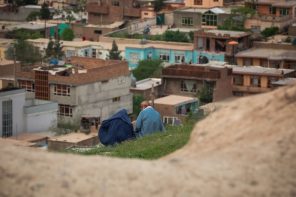We’ve all heard this rehearsed now, many times. The reasons for our preemptive invasion of a sovereign nation keep changing. So do the benchmarks by which we measure our “success.”
In the beginning, it was about “weapons of mass destruction,” Saddam’s desire to acquire them, our determination that he not do so. But he didn’t have any.
So then it became about Saddam Hussein, the man and the war criminal, and our invasion was framed as the long overdue ouster of one of the region’s main thugs, a generous act of giving a people their country back. But that is a tricky precedent since, by these lights, there are a great many countries we ought to be invading—Sudan, at a minimum. Not bombing, invading. So the ouster of Saddam Hussein was hung, once again, on a larger geopolitical canvas and a very bold dream: the irresistible march of freedom and democracy, a successful Iraq serving as a beacon for similar aspirations of other less-free peoples in this long-suffering region.
But that is an impossible dream to sell today, given how terribly wrong the Iraqi experiment has gone. And so, with WMDs, genocidal tyrants, and “freedom on the march” all crossed off the list of explaining what we are still doing in Iraq, we have only one arrow in the quiver, one card left to play. Terrorism.
“Iraq is now the front in our global war on terror.” It was not so when we invaded the country in January 2003, but it is now. This war is the only war: the global war on terror. Terrorists, pursued with what can only be called a religious zeal, a passionate commitment to the homeland that would make a Roman blush, are noxious in a new and more dangerous way, these days.
Terrorists simply refuse to make a distinction between combatants and non-combatants; they target everyone. They refuse to make that distinction which lies at the very heart of the Christian inspired Just War tradition, as well as more recent canons of international law.
And now the plot thickens, as terrorists appear in the unlikeliest of places. Nuclear weapons refuse to make this distinction. Pretty much all weapons of mass destruction are terroristic in this precise sense. And it is the linkage of terrorists with weaponry we have not yet recognized as terroristic that arguably places us in a moral position which is unlike anything the Romans faced.
So we find ourselves in a peculiar muddle. Those whom we deem terrorists accuse us of the same crime. In order to do battle with their brand of terror, we have been willing to erase or elide any number of crucial distinctions, and to create new classes of persons along the way. All of those deemed terrorists who now languish in Guantanamo Bay and elsewhere have been defined as enemy-combatants-who-are-not-really-combatants. The problem is that if they are combatants, then there are rights and rules that apply to them. If we do not wish these rights or rules to apply to them, then we must define them in some other way.
It is not terrorism which should occupy our attention, so much as the dangerous proliferation of new and indiscriminate weapons. It is the enormity, and the gravity, and the global nature of this threat that demands global partnerships, and the long view. Both have been in short supply.




